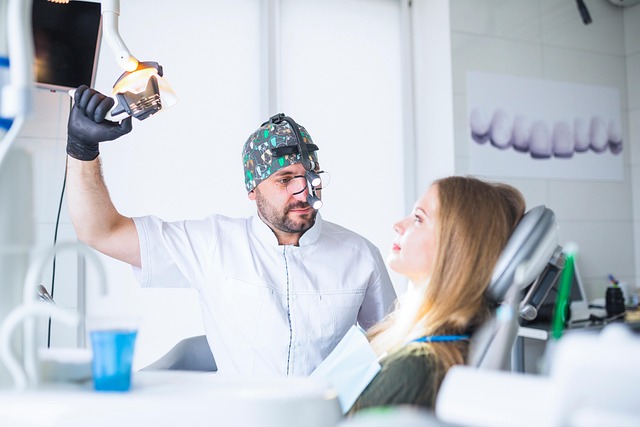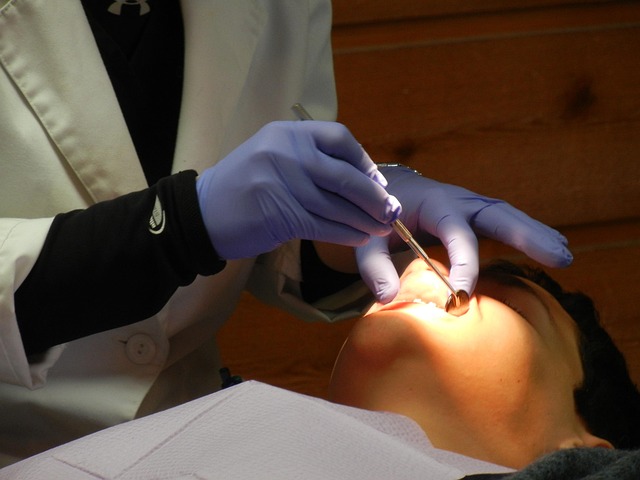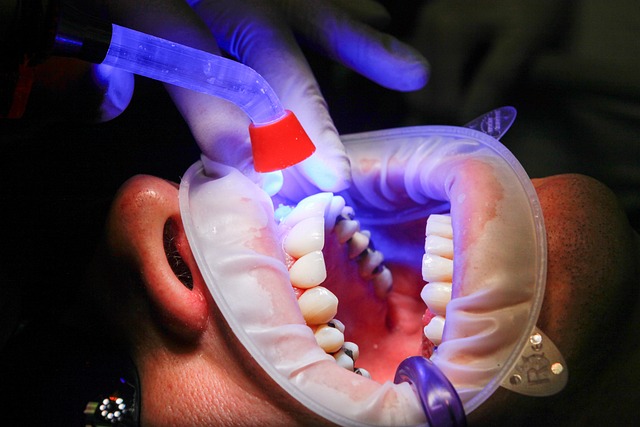Category: dentist it consulting mcallen tx
Dentist IT Consulting McAllen TX: A Comprehensive Guide
Introduction
Welcome to an in-depth exploration of a specialized yet impactful field: Dentist IT Consulting in McAllen, Texas. This article aims to unravel the complexities and highlight the significance of this unique consulting service within the dental industry. By delving into its various aspects, we will empower dental professionals, business owners, and investors alike to navigate the digital landscape effectively. In today’s interconnected world, understanding the role of technology in dentistry is paramount, making this article a valuable resource for anyone seeking clarity in this realm.
Understanding Dentist IT Consulting McAllen TX: A Definition and Its Essential Elements
Definition: Dentist IT consulting refers to the specialized service that aids dental practices in leveraging information technology (IT) solutions to streamline operations, enhance patient care, and improve overall practice management. It involves assessing a dental clinic’s current technological infrastructure, identifying areas for improvement, and implementing strategic IT initiatives tailored to their unique needs.
Core Components:
-
Practice Management Software: This is the backbone of any efficient dental practice. It includes tools for scheduling appointments, managing patient records, billing, and accounting. Customized software solutions can integrate various aspects of dental practice management, ensuring a seamless flow of operations.
-
Digital Imaging and Radiography: The adoption of digital X-rays and advanced imaging technologies improves diagnostic accuracy and allows for faster, more efficient patient care. These tools enable remote consultations and facilitate better communication with specialists.
-
Electronic Health Records (EHRs): EHR systems replace traditional paper charts, providing a centralized, secure, and easily accessible repository for patient data. This modern approach ensures that every member of the dental team has immediate access to critical information.
-
Teledentistry: Telemedicine, or teledentistry, enables dental professionals to provide remote consultations, especially in rural or underserved areas. It involves using video conferencing, mobile apps, and other digital tools to offer dental care without geographical barriers.
-
Cybersecurity: With increasing digitisation, protecting sensitive patient data becomes paramount. Dentist IT consultants ensure that practices implement robust security measures, including encryption, access controls, and regular backups, to safeguard against cyber threats.
Historical Context: The integration of technology in dentistry has evolved significantly over the past few decades. From basic computerization to implementing specialized software, dental practices have embraced digital transformation. McAllen, Texas, as a thriving dental hub, has been at the forefront of adopting innovative IT solutions, ensuring its practitioners stay competitive and provide high-quality care.
Global Impact and Trends
The influence of dentist IT consulting extends far beyond McAllen’s borders. This trend is a global phenomenon, shaping the future of dental healthcare worldwide:
| Region | Impact and Trends |
|---|---|
| North America | Leading the way in digital dentistry, with widespread adoption of EHRs and advanced imaging technologies. Teledentistry is gaining traction, especially in rural areas. |
| Europe | Striving for interoperability between different IT systems used in dental practices. Strict data privacy regulations, like GDPR, influence how dental practices manage patient records. |
| Asia-Pacific | Rapidly growing adoption of digital solutions due to economic development and a young, tech-savvy population. Mobile dentistry apps are gaining popularity for convenient appointment scheduling and remote consultations. |
| Middle East & Africa | Investing in IT infrastructure to bridge healthcare gaps. Teledentistry is seen as a way to improve access to dental care in underserved communities. |
Economic Considerations: Market Dynamics and Growth Opportunities
The dentist IT consulting market is experiencing substantial growth, driven by several economic factors:
-
Digital Transformation: The global shift towards digitizing healthcare has led to increased demand for specialized IT services in the dental sector.
-
Government Initiatives: Many countries are incentivizing dental practices to adopt digital technologies as a way to improve patient outcomes and reduce costs. These initiatives can significantly impact market growth.
-
Patient Expectations: Modern patients expect seamless, efficient, and convenient healthcare experiences. This has fueled the need for advanced IT solutions in dental practices.
Market Dynamics:
| Segment | Description | Growth Potential |
|---|---|---|
| Practice Management Software | Essential tools for streamlining administrative tasks and improving practice efficiency. | High, due to increasing demand for streamlined operations. |
| Dental Imaging & Radiography | Advanced imaging technologies enhance diagnostic accuracy and patient care. | Moderate to high, with continuous technological advancements. |
| Cybersecurity Services | As cyber threats evolve, specialized cybersecurity services are in high demand to protect sensitive data. | Steadily growing, driven by stringent data privacy regulations. |
| Teledentistry Platforms | Remote consultation tools gain popularity for providing accessible dental care. | Significant growth potential, especially in underserved regions. |
Technological Advancements: Shaping the Future of Dental Care
The field of dentist IT consulting is characterized by rapid technological progress, which offers both challenges and exciting opportunities:
-
Artificial Intelligence (AI): AI algorithms can analyze dental images, assist in diagnosis, and even provide personalized treatment recommendations. This technology has the potential to revolutionize patient care and practice management.
-
Internet of Medical Things (IoMT): Wearable devices and smart oral health monitoring systems can collect real-time data on patient oral health. These connected devices offer remote monitoring capabilities and enable proactive dental care.
-
Blockchain Technology: This distributed ledger technology ensures secure, tamper-proof storage of patient records, enhancing data privacy and interoperability between healthcare providers.
-
5G Connectivity: Faster, more reliable connectivity enables seamless teledentistry sessions and supports the growing demand for remote consultations.
Policy and Regulation: Navigating Legal Considerations
The dental IT consulting industry operates within a framework of stringent regulations, ensuring patient data privacy and ethical practices:
-
Health Insurance Portability and Accountability Act (HIPAA): In the US, HIPAA sets standards for protecting sensitive patient information in electronic transmission. Dentist IT consultants must ensure practices comply with these regulations to avoid legal repercussions.
-
General Data Protection Regulation (GDPR): In Europe, GDPR provides guidelines for collecting, processing, and storing personal data, including patient records. Practices operating across borders or using cloud-based services must adhere to these standards.
-
Local Data Privacy Laws: Many countries have their own data protection regulations that dental practices must follow. For instance, Australia’s Privacy Act 1988 and Canada’s Personal Information Protection and Electronic Documents Act (PIPEDA) are examples of comprehensive data privacy legislation.
Challenges and Criticisms: Overcoming Barriers to Adoption
Despite its numerous benefits, dentist IT consulting faces several challenges and criticisms:
-
Initial Cost Implementation: Implementing advanced IT systems can be expensive for smaller dental practices. This barrier often leads to reluctance in adopting new technologies. Offering flexible financing options and government grants can help mitigate this issue.
-
Skill Gap: The rapid pace of technological advancements may leave dental professionals and staff lacking the necessary skills to use these tools effectively. Continuous training programs and partnerships with IT experts can address this challenge.
-
Data Security Concerns: With increasing cyber threats, some practices are hesitant to digitize patient records. Robust cybersecurity measures, including regular security audits and employee training, can alleviate these concerns.
-
Interoperability Issues: Different software systems used in dental practices may not communicate seamlessly, leading to data silos. Standardization and interoperability protocols can resolve this issue, ensuring a connected healthcare ecosystem.
Case Studies: Real-World Success Stories
Case Study 1: Digital Transformation in a Multi-Location Dental Practice
Challenge: A growing dental practice with multiple locations struggled to manage patient records and schedule appointments efficiently across all branches.
Solution: The consultant implemented a centralized EHR system, integrated with practice management software. This allowed for seamless data sharing between locations, improving patient care continuity and streamlining administrative tasks.
Outcome: Resulted in a 30% increase in appointment efficiency, improved patient satisfaction scores, and reduced operational costs.
Case Study 2: Teledentistry Revolutionizes Rural Dental Care
Initiative: A rural dental clinic partnered with a tech startup to introduce teledentistry services, aiming to reach patients in nearby communities.
Implementation: The clinic invested in high-quality video conferencing equipment and trained staff to conduct remote consultations. They also developed user-friendly mobile apps for convenient patient scheduling.
Impact: Within six months, the number of new patients increased by 25%, and patient retention rates improved significantly. Teledentistry also reduced travel costs for both patients and dental professionals.
Future Prospects: Emerging Trends and Growth Areas
The dentist IT consulting industry is poised for significant growth, with several emerging trends shaping its trajectory:
-
AI-Powered Diagnostics: AI algorithms will play a more prominent role in analyzing dental images, helping dentists make faster, more accurate diagnoses.
-
Personalized Medicine: Using patient data analytics, dentists can offer tailored treatment plans, improving patient outcomes and reducing unnecessary procedures.
-
Remote Monitoring and Telehealth: The rise of wearable oral health devices and remote monitoring systems will enable continuous patient care and early detection of dental issues.
-
Cloud Computing: Cloud-based IT solutions offer scalability, flexibility, and cost-effectiveness for dental practices, ensuring secure data storage and accessibility.
Conclusion: Embracing Digital Transformation in Dentistry
In conclusion, dentist IT consulting McAllen TX is not just a trend but a necessary evolution in the dental industry. It empowers dental professionals to deliver more efficient, effective, and accessible care. By embracing technology, dental practices can enhance patient experiences, improve operational efficiency, and stay competitive in an increasingly digital healthcare landscape. As we look ahead, the future of dentistry is intertwined with technology, presenting both opportunities and challenges. Those who adapt and innovate will be at the forefront of providing exceptional dental care for generations to come.
FAQ Section: Answering Common Concerns
Q: How much does dentist IT consulting cost?
A: Costs vary based on the size of the practice, chosen services, and specific technology requirements. Consultants typically offer customized packages, and many provide financing options to make it more accessible.
Q: Is my patient data safe in the cloud?
A: Cloud storage providers implement robust security measures, including encryption and access controls, to safeguard patient data. However, it’s crucial to choose reputable vendors who comply with relevant data privacy regulations.
Q: Can teledentistry replace in-person dental visits?
A: Teledentistry is a valuable tool for remote consultations and diagnosis but cannot fully replace in-person visits. Face-to-face interactions are essential for comprehensive dental care, especially for complex procedures.
Q: How do I ensure my dental practice’s IT systems are compliant with regulations?
A: Regularly review and update your IT policies to align with relevant data privacy laws. Engage with IT consultants who have experience navigating these regulations and can provide guidance on implementing necessary controls.
Uncover Your Perfect Dental Partner in McAllen, TX

Optimal oral health in McAllen, TX starts with a skilled dentist from Dentist it Consulting McAllen…….
Find Your Perfect Dental Match in McAllen, TX with Consulting

Optimal oral health requires a personalized approach. Dentist It Consulting McAllen TX offers multil…….
Unleash Dental Success: McAllen Consulting for Growth
Future-Proof Your Dental Business: McAllen TX Strategy

The McAllen, TX dental market combines traditional and innovative practices fueled by population gro…….
McAllen Dental Success: Online Strategies for Local Growth
Expanding Dental Care in McAllen: Strategies for Community Wellness

Dentist it Consulting McAllen TX offers tailored dental solutions for diverse needs, combining digit…….
Boost Dental Retention: Strategies for McAllen Success with Consulting

McAllen dental patient retention faces challenges beyond routine care. Dentist it Consulting McAllen…….
Expanding Dental Services: McAllen TX Consulting & Growth Strategies

McAllen, TX, has seen a surge in dental services led by local professionals like Dr. Joey Cazares, f…….
Revolutionizing Dental Care: Analytics in McAllen, TX

In McAllen, TX, dentist it consulting mcallen tx is revolutionizing dentistry through data analytics…….


